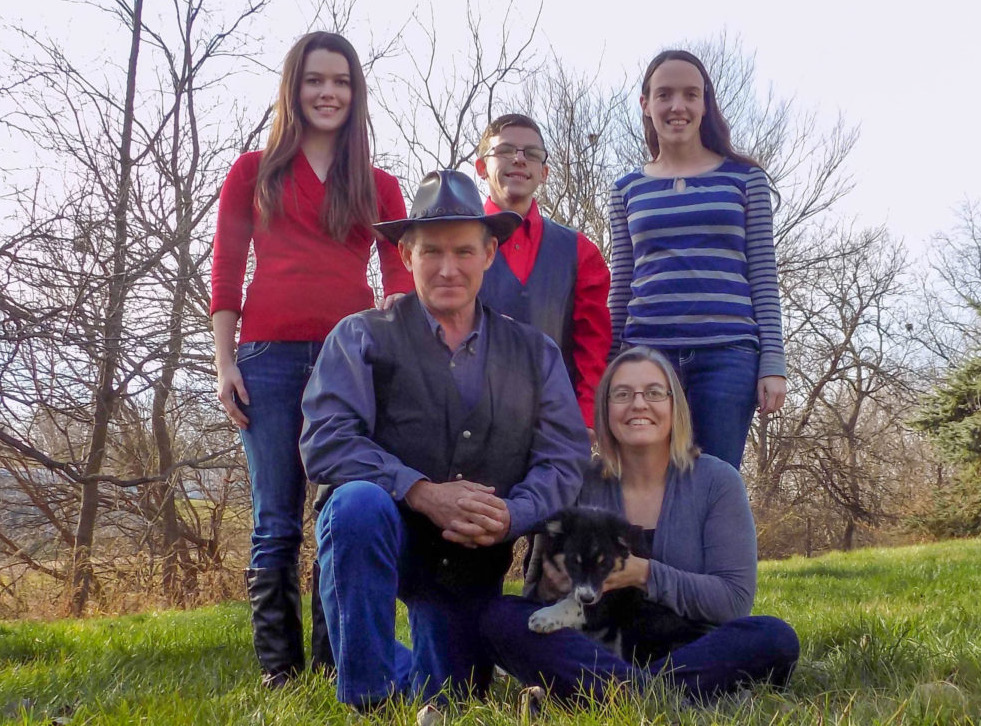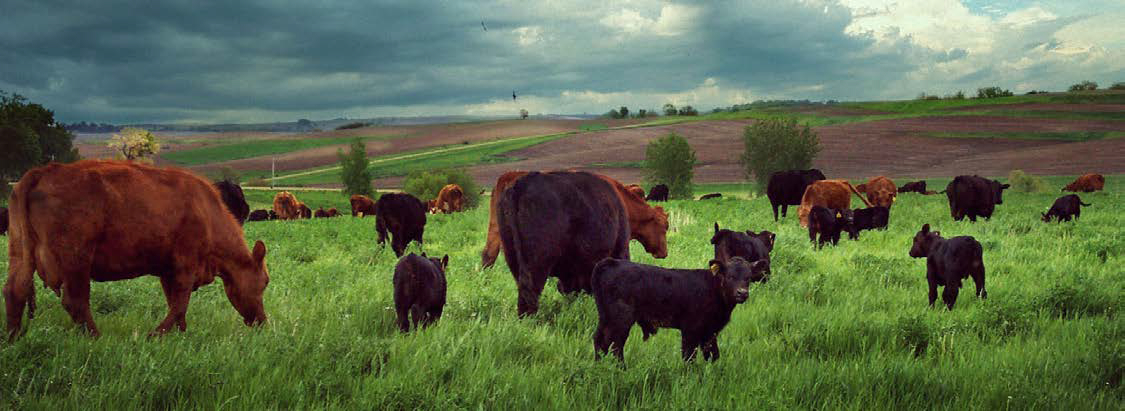Growing Up in PFI
Grace German, daughter of long-time members Tom and Kristi German, grew up as the fourth generation on Thankful Harvest farm, a certified organic crop and livestock farm in Holstein, Iowa. The Germans raise 100% grass-fed beef and lamb; pork; free-range chicken and turkey; and free-range, soy-free eggs, focusing on rotational grazing to help steward the land and provide high-quality products.
While growing up on a farm in Iowa may not be unique, growing up on a PFI farm is. Tom and Kristi German are among PFI’s first members. Joining in July 1985, the same year Practical Farmers was founded, they were part of the earliest cohort of farmers to form the fledging organization. Grace was born in 1998 into the PFI network and grew up witnessing the power of curiosity and collaborative thinking. These values infused her childhood, and buttressed her when she moved off the farm to begin charting her own sustainable agriculture and local foods journey.

Grace German (back left) poses with her siblings Daniel and Morgan, parents Tom and Kristi and their dog, Sage.
Setting the Foundation
Today, Grace is the marketing coordinator of a dairy farm in Illinois that’s dedicated to marketing locally – but she credits her farm upbringing, and her father’s influence and example, with imparting the values she holds today. “I learned every life lesson from my dad on the back of a four-wheeler moving cows,” Grace says. “Everything about life, from how to treat animals and people, to caring for the livestock and the land.” Grace says those lessons were reinforced by observing what her father devoted his time and attention to. One of those things was Practical Farmers of Iowa, especially field days and the annual conference.
Her parents’ commitment to PFI meant Grace spent a lot of time in PFI company – and she says some of her oldest and fondest childhood memories are of Practical Farmers of Iowa events. “I remember attending the annual conference as a little kid. We would run around and sit in the back of the sessions and color,” Grace says. “PFI members felt like family and the adults would let us kids run around knowing we would always find friends to be with.”
She has no doubt her young mind was absorbing an important appreciation for the farmers around her and their collective goal to better the landscape. As she grew older, Grace began to pick her own sessions to attend and think more critically about what farm enterprises she wanted to play a part in. She also observed how farmers in PFI’s network interacted and approached finding solutions to farming challenges.
“Watching a bunch of farmers sit at a table or stand in a field and collaborate and problem-solve, and seeing ideas about how to make things better come out of those conversations – that is a great strength,” says Grace of the PFI network. She also watched her dad call on his PFI farmer network to troubleshoot issues and celebrate successes.
This experience of community, of being there for one another in adversity and joy, modeled how collaboration and creativity are necessary for resilient farms, communities and agriculture. Grace credits PFI events with showing her the possibilities that exist for agriculture and local food systems, and with helping guide the direction of her education and career.
Charting the Course
Influenced by PFI and her own farm upbringing, she decided to study animal science in college. In May 2021, she received her bachelor’s degree from Iowa State University. “Growing up on a certified organic, diversified crop and livestock operation showed me that agriculture can be sustainable,” Grace says, “and I’m passionate about how livestock play a part in that narrative.”
Her undergraduate studies included a deep dive into sustainable agriculture, specifically beef production. For her honors program research, Grace studied the role of beef cattle in regenerative agriculture. Partnering with Mark Rasmussen, who served as director of the Leopold Center for Sustainable Agriculture at ISU until his retirement in July 2021, she studied how cattle can serve as catalysts for biodiversity. Her published research draws on multiple scientific journals, explaining the common threads that cattle allow us to preserve pasture while still producing food, improving the soil and helping plants take more carbon into the soil.
The idea for the project was inspired by her own farm experience growing up. “Watching cattle raised from birth to finishing, and seeing that meat sold directly to consumers, I could see how cattle were a benefit to our farm and I wanted to help change the narrative and show cattle in a positive light,” Grace says.
“Watching a bunch of farmers sit at a table or stand in a field and collaborate and problem-solve, and seeing ideas about how to make things better come out of those conversations – that is a great strength.” -Grace German on the value of PFI’s knowledge-sharing ethos
Interning with ISU Extension and Outreach as a communications team member for the Small Farms Team also strengthened her passion for local food. In this role, she shared the experiences of local growers in niche markets and worked to equip fruit and vegetable growers with the knowledge needed to sell wholesale or retail to schools, grocers, restaurants and institutions. “The team at Extension helped me see a different side of the local foods movement and how we can work together to connect pieces and overcome the challenges of local foods systems.”
In 2016, inspired by local flavors and relationships, Grace started her own business, Grace’s Pies, where she used her baking skills to offer pies, jams, rolls, coffeecakes, breads and seasonal holiday offerings to the Holstein and Ida Grove communities. She continued this business through college, focusing on her holiday offerings during breaks and selling a variety of goods throughout summer 2020. Grace sold baked goods directly to consumers at local farmers markets and through individual orders.
“One of my favorite things is using in-season, locally grown fruits and ingredients and turning them into products that connect people to their local foods,” Grace says. The business helped unite her interests in local food and community, and deepened her passion for selling food directly to consumers in a way that links food and agriculture.
Working With Local Foods
Today, Grace works as the marketing coordinator for Rolling Lawns Farm, a 111-year-old family dairy in Greeneville, Illinois, that focuses on local sales within a 75-mile radius. The farm’s owners prioritize sharing agriculture with local consumers, including bringing people to the farm to meet the cows the milk comes from. In her role, Grace focuses on marketing the farm’s products to wholesale and retail customers, sharing the farm with visitors through tours and social media, helping with new product launches and pitching in with the odds and ends that can come with running a small business.
“Supporting local foods and the communities surrounding them is engrained in who I am,” she says. “This job is the culmination of my family farm, PFI involvement and undergraduate experiences. I get to see a thriving local foods system that I’ve heard so many farmers dream of achieving.”
Local food models that inspire consumers and bring agriculture front and center for the public are increasingly possible. Grace recounts how a customer recently visited the farm and told her it was an inspiration. She says, “I want everyone, everywhere who visits a local food hub to feel that way about the products and place.”

